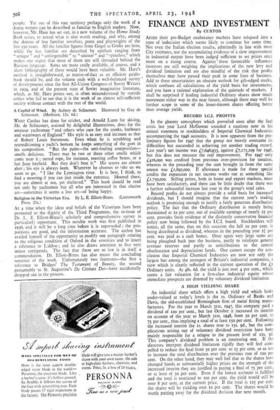FINANCE AND INVESTMENT
By CUSTOS
AFTER their pre-Budget exuberance markets have relapsed into a state of indecision which seems likely to continue for some time. Not even the Italian election results, admittedly in line with most City estimates, nor the accumulating evidence of a slow improvement in industrial output have been judged sufficient to set prices once more on a rising course. Against these favourable influences investors are still weighing the implications of the new levy and dividend limitation and are also mindful of the risk that profits themselves may have passed their peak in some lines of business. Add to these uncertainties an obscure outlook for gilt-edged, stocks, which confuses all calculations of the yield basis for investments, and you have a rational explanation of the quietude of markets. I shall be surprised if leading industrial Ordinary shares show much movement either way in the near future, although there may well be further scope in some of the lesser-known shares offering, better than average yields.
RECORD PROFITS
In the gloomy atmosphere which prevailed soon after the fuel crisis last year Lord McGowan sounded a cautious note in his annual statement to stockholders of Imperial Chemical Industries accompanying the 1946 accounts. It is now apparent from the pre- liminary figures for 1947 that the group not merely overcame its difficulties but succeeded in achieving yet another trading record. Last year's net income was £7,646,933, against £7,171,109 for 1946, but this does not measure the real improvement. For 1947 only £426,000 was credited from previous over-provision for taxation, whereas in the preceding year the sum brought in from the same source was L1,692,000. If allowance is made for these special credits the expansion in net income works out at something like £1,750,000. Selling prices, both in home and export markets, must have been satisfactory, and there can be little doubt that there was a further substantial increase last year in the group's total sales.
Record profits do not always provide a solid basis for increased dividends, but I should imagine that the current year's trading outlook is promising enough to justify a fairly generous distribution policy. The fact that the Ordinary distribution is merely being maintained at to per cent, out of available earnings of nearly 25 per cent. provides fresh evidence of the distinctly conservative financial policy now being followed by the I.C.I. board. Stockholders will notice, all the same, that on this occasion the full to per cent. is being distributed as dividend, whereas in the preceding year 24 per cent, was paid as a cash bonus. Once again very large sums are being ploughed back into the business, partly to reinforce general revenue reserves and partly as contributions to the central obsolescence and depreciation funds. One cannot escape the con- clusion that Imperial Chemical Industries are now not only the largest but among the strongest of Britain's industrial companies, a view which is clearly- reflected in the current quotation of the Li Ordinary units. At 48s. 6d. the yield is just over 4 per cent., which seems a fair valuation for a first-class industrial equity whose immediate prospects are dimmed by voluntary dividend limitation.
A HIGH YIELDING SHARE An industrial share which offers a high yield and which looks under-valued at today's levels is the is. Ordinary of Banks and Davis, the old-established Birmingham firm of metal fitting manu- facturers. For the year to March 31st, 1947, this company paid a dividend of too per cent., but last October it increased its interim on account of the year to March 31st, 1948, from 5o per cent. to 75 per cent., thus implying a total of at least 15o per cent. Following the increased interim the is. shares rose to 15s. 9d., but the com- plications arising out of voluntary dividend restriction have been mainly responsible for a relapse to the present level of ns. 3d. This company's dividend problem is an interesting one. If the directors interpret dividend limitation rigidly they will feel com- pelled to reduce the final from so per cent. to 25 per cent. so as not to increase the total distribution over the previous rate of too per cent. On the other hand, they may well feel that as the shares have changed hands at substantially higher prices on the strength of the increased interim they are justified in paying a final of 75 per cent., or at least of so per cent. Even if the lowest estimate is fulfilled and the total is restricted to too per cent. the yield would still be over 8 per cent. at the current price. If the total is 125 per cent. the shares will be yielding over to per cent. The shares would be worth putting away for the dividend decision due next month.


































 Previous page
Previous page